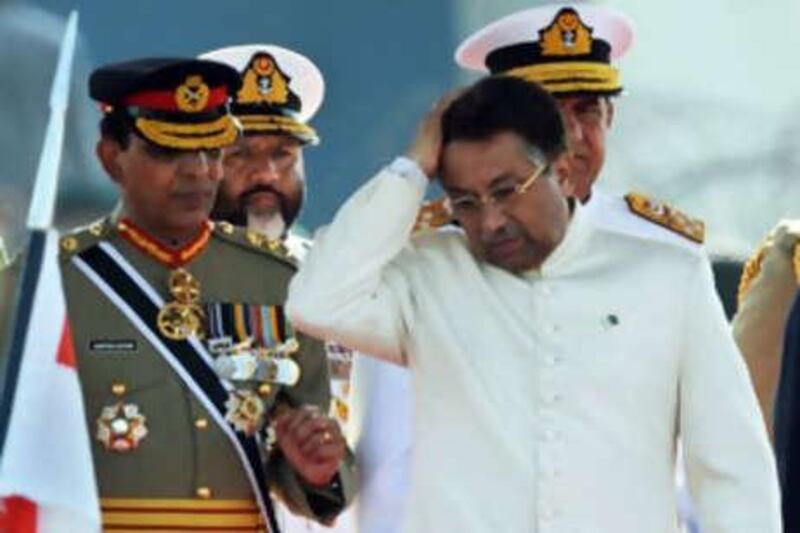ISLAMABAD // Pakistan's powerful army holds the key to whether Pervez Musharraf can survive the threat of impeachment by his foes in the ruling coalition, some analysts say. With the impeachment process against the president set to begin in parliament tomorrow, they believe Mr Musharraf will be looking for signals from Gen Ashfaq Parvez Kayani, the enigmatic man who succeeded him as army chief in November.
If he gets Gen Kayani's backing, Mr Musharraf could dissolve parliament or even declare emergency rule. If he does not, he will be under pressure to quit before enduring the humiliation of being impeached. "The only option he has for survival is to get the support of the army chief," said Hasan Askari Rizvi, a security and political analyst. The announcement of impeachment plans by the coalition leaders, Asif Ali Zardari and Nawaz Sharif, on Thursday left Mr Musharraf facing the most serious challenge since he seized power in a military coup nine years ago.
Farhatullah Babar, a spokesman for Mr Zardari's Pakistan People's Party, confirmed yesterday that the national assembly, or lower house of parliament, has been summoned tomorrow afternoon to begin the process to impeach the president. Mr Musharraf's allies say the former special forces commando will fight back. "He will defend himself and we feel that he will have a lot of support within the parliament," said Mushahid Hussain, the secretary general of the Pakistan Muslim League-Q, a pro-Musharraf party.
They say Mr Musharraf believes that the coalition cannot get the two-thirds combined majority it needs in the upper and lower chambers of parliament to turf him out of office. It currently has 266 of the required 295 MPs and is counting on persuading independents. But Mr Musharraf might decide not to take the risk on a vote, and could opt instead for a pre-emptive strike. Under the highly controversial Article 58-2B of the Pakistani constitution, he has the power to dissolve the five-month-old national assembly. The constitution also allows him to declare a state of emergency as he did in November.
Either step would require the full backing of the army. Yet while the military has ruled over Pakistan for more than half its 61-year history, analysts have said Mr Musharraf cannot rely on Gen Kayani to do his bidding. "Kayani has made it very clear he would like to keep the army distant from politics," said Farzana Shaikh, a Pakistan expert at Chatham House, a London-based think tank. Gen Kayani is also credited with ensuring the fairness of general elections in February, in which Mr Musharraf's allies suffered a crushing defeat. "Kayani is concerned with the image of the army in recent months has been soiled and tarnished also by the fighting Islamic militants in the tribal areas," Ms Shaikh said.
The chain-smoking Gen Kayani remains a shadowy figure. As a former chief of Pakistan's intelligence agency, the ISI, he has never given an interview. Mr Musharraf, who by contrast has always been bluff and media-friendly, is said to have appointed him as his successor because of his discretion, loyalty and dedication to the army. But reports emerged last month of the general having long meetings with Mr Musharraf to discuss his future. A meeting on Thursday and Friday of Pakistan's Corps Commanders, chaired by Gen Kayani, sparked further speculation, although officials said it had already been scheduled.
"The whole meeting they will definitely have been talking about the situation inside Pakistan," Mr Rizvi said. Analysts said that if Gen Kayani backed the dissolution of the parliament it would be highly unpopular and possibly result in violent protests. "An alternative scenario would be for General Kayani to prevail on Musharraf to make a graceful exit that would allow for the installation of a new president," said Lisa Curtis, a research fellow, in a commentary for the Washington-based Heritage Foundation.
Mr Musharraf has previously said he would not quit, but Gen Kayani may make it clear it is unacceptable for a former army chief to drag the military's name through the mud in an impeachment imbroglio. "If the army does move, it would not move so much in terms of a takeover bid against the president, but will perhaps try to prevail on Musharraf to step down himself," Ms Shaikh said. The US has so far refused to help its key ally in its "war on terror", to whom it has given billions of dollars in military aid, saying only that the impeachment is an internal matter.
One last hope for Mr Musharraf may be to try to drag out the situation in a bid to prolong his grip on power. He could fight impeachment in the Supreme Court - the only institution on which he can rely, having stacked it with loyal judges during a state of emergency in November. "He will very likely spin it out over the next weeks and months," Ms Shaikh said. But the ultimate decision may not be the president's to make, analysts said.
"Musharraf's fate and the future direction of Pakistan is largely in the hands of General Kayani," Ms Curtis said. * The National





